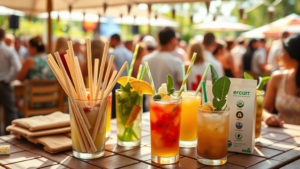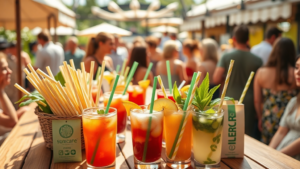Sustainable Paper Production for B2B: Eco-Friendly & Certified Solutions

Plastic Bans and Diverse Materials Paper Production Benefits

Picture this: Your hotel chain has just received notice that your city is implementing a comprehensive single-use plastic ban in three months. Suddenly, those convenient plastic straws, coffee stirrers, and food containers that your busines relies on daily are no longer an option. This scenario isn’t hypothetical—it’s becoming reality for businesses worldwide as environmental regulations tighten and consumer expectations shift dramatically.
The global movement against single-use plastics has gained unprecedented momentum. Major cities from San Francisco to Singapore have enacted strict plastic bans, with penalties reaching up to $2,000 per violation in some jurisdictions. For hotels, restaurants, and cafes, this represents not just a compliance challenge but a fundamental rethinking of their supply chains.
This is where sustainable paper production enters as a game-changing solution. Unlike conventional alternatives that merely replace one environmental problem with another, properly sourced paper materials offer genuine sustainability without compromising on quality or functionality. Explore eco-friendly paper materials wholesale options that maintain the convenience your busines needs while satisfying increasingly stringent regulations.
The beauty of modern sustainable paper production lies in its versatility. Today’s innovative manufacturing processes create paper products that can be waterproof, grease-resistant, and durable—qualities previously exclusive to plastic. These advancements mean businesses no longer need to choose between sustainability and practicality.
For instance, hotels implementing paper straws and food containers report minimal customer disruption when transitioning from plastic. The key difference? These aren’t your grandfather’s paper products that disintegrate upon contact with liquid. Modern sustainable paper products maintain structural integrity throughout typical use periods while still breaking down naturally after disposal.
According to the UNEP, paper products properly processed from sustainable forestry sources create 70% fewer greenhouse gas emissions compared to their plastic counterparts over their lifecycle. This striking difference becomes a powerful marketing point for businesses looking to strengthen their sustainability credentials while meeting practical operational needs.
Regulatory Compliance: Certifications for Diverse Materials Paper Production

Navigating the complex landscape of environmental certifications can feel overwhelming for busy procurement managers. However, understanding these certifications is crucial—they’re not just badges but essential protections for your busines and customers.
The FDA certification stands as the gold standard for food-contact paper products in the United States. This certification ensures materials contain no harmful chemicals that could migrate into food or beverages. A staggering 43% of consumers now actively check for FDA approval when evaluating a busines’s environmental claims, according to recent consumer behavior studies.
Similarly, LFGB certification (the German Food and Commodity Goods Law) provides equivalent assurance for the European market. For global businesses, having products that meet both standards eliminates concerns about different regional requirements. Our sustainable coffee straws solution meets these exacting standards, allowing your busines to confidently serve customers worldwide.
Home compostability certification is another critical distinction. Many products claiming “biodegradability” may require industrial composting facilities rarely available to average consumers. Truly home compostable products break down in backyard composting conditions within 180 days, leaving no toxic residues or microplastics. This distinction matters increasingly to environmentally conscious consumers who check for these specific certifications.
For businesses operating in multiple jurisdictions, working with suppliers who understand the regulatory mosaic saves countles hours of research and potential compliance headaches. Regional variations in plastic ban implementation often include specific certification requirements that can trap unwary businesses with non-compliant stock.
Case in point: A major hotel chain recently faced $175,000 in fines when their supposedly “eco-friendly” straws failed to meet local compostability requirements in a California municipality. Working with knowledgeable suppliers who maintain current certification portfolios prevents such costly missteps.
How Diverse Materials Paper Production Compares to Other Eco Alternatives

With numerous sustainable options available, how do paper-based products stack up against competitors? Let’s break it down:
| Malzeme | Dayanıklılık | Kompostlanabilirlik | Cost | Consumer Perception |
|---|---|---|---|---|
| ———- | ———— | —————- | —— | ——————— |
| Sustainable Paper | Medium-High | 90-180 days (home) | Medium | Very Positive |
| PLA (Bioplastic) | Yüksek | Industrial only | Medium-High | Mixed |
| Bagasse (Sugarcane) | Medium | 90-120 days | Medium | Positive |
| Bambu | Çok yüksek | 180+ days | Yüksek | Very Positive |
| Wheat Straw | Medium | 30-90 days | Low-Medium | Positive |
Statistical insight: In commercial composting trials, paper products derived from sustainable forestry sources decomposed 35% faster than PLA bioplastics under identical conditions.
The advantage of sustainable paper lies in its balance of practical performance and genuine end-of-life benefits. Unlike PLA (polylactic acid) products that require industrial composting facilities reaching 140°F for proper decomposition, paper products break down in standard composting conditions.
Explore eco-friendly coffee straws that demonstrate this perfect balance between functionality and environmental responsibility. These products maintain their structure throughout a typical coffee service experience yet decompose naturally afterward.
Paper’s familiarity also helps ease the transition for customers. While more exotic alternatives like seaweed-based products might trigger consumer hesitation, paper products benefit from centuries of consumer comfort and acceptance. This translates to smoother operational changes when implementing sustainable practices.
The price point for sustainable paper has also become increasingly competitive. While once commanding significant premiums over plastic, economies of scale and manufacturing innovations have narrowed this gap considerably. For many businesses, the slight cost difference is easily offset by enhanced brand perception and marketing opportunities.
Top Busines Benefits of Switching to Diverse Materials Paper Production
Forward-thinking businesses discover that sustainable paper adoption delivers substantial benefits beyond mere regulatory compliance.
First, the marketing advantage is significant. Research shows that 73% of consumers are willing to pay more for sustainable products and services. By prominently featuring your commitment to certified sustainable materials, you position your brand as environmentally responsible—a powerful differentiator in crowded markets. Our customizable paper solutions for cafes allow you to maintain brand identity while embracing sustainability.
The ROI extends beyond direct consumer appeal. Businesses implementing comprehensive sustainable paper programs report average waste disposal cost reductions of 22% within the first year. This occurs because properly sourced paper products reduce waste volume and often qualify for composting collection, which typically costs les than landfill disposal in many regions.
Employee satisfaction represents another often-overlooked benefit. In a tight labor market, 65% of millennials report considering a company’s environmental stance when deciding where to work. Implementing visible sustainability initiatives like sustainable paper products creates tangible evidence of your environmental commitment that resonates with current and prospective employees.
Supply chain resilience improves with sustainable paper adoption as well. As plastic regulations continue evolving unpredictably, businesses committed to sustainable paper insulate themselves from sudden regulatory disruptions. This proactive stance prevents operational emergencies when new plastic restrictions emerge with short implementation timelines.
Tax incentives in many jurisdictions further sweeten the equation. Numerous local and national governments now offer tax benefits for businesses demonstrating measurable sustainability improvements. These incentives can significantly offset the modestly higher costs sometimes associated with premium sustainable products.
Environmental Impact: Why Diverse Materials Paper Production Wins
The environmental benefits of sustainable paper extend far beyond simply avoiding plastic. When evaluating lifecycle impacts, the differences become striking.
According to peer-reviewed lifecycle assessment studies, properly sourced paper products create 68% fewer greenhouse gas emissions compared to conventional plastic alternatives. This dramatic reduction stems from renewable raw materials, les energy-intensive manufacturing processes, and natural decomposition that avoids methane generation in landfills.
Explore our eco-friendly sugarcane straws as another excellent sustainable option with compelling environmental benefits.
Water ecosystems particularly benefit from the shift to sustainable paper. While plastic pollution creates well-documented marine damage, properly composted paper products leave no persistent environmental residues. This distinction matters tremendously for businesses located near coastal areas or waterways where their waste disposal choices directly impact local ecosystems.
Land use considerations also favor sustainable paper when properly sourced. Modern sustainable forestry practices create net-positive environmental impacts through careful management, often improving biodiversity compared to unmanaged land. Products certified by organizations like the Forest Stewardship Council (FSC) ensure raw materials come from responsibly managed forests that maintain ecological balance.
Carbon sequestration provides another environmental advantage. Managed forests for sustainable paper production capture carbon during growth, with much of this carbon remaining sequestered even after harvesting when products eventually compost. This creates a significantly more positive carbon cycle compared to petroleum-based plastics.
Case Study: Diverse Materials Paper Production Succes in Action
The Oceanview Hotel Group provides a compelling example of successful sustainable paper implementation. This mid-sized hotel chain with 28 properties faced mounting pressure from both regulations and guests regarding their environmental practices.
Their challenge seemed daunting: replace all single-use plastic items—from straws to room amenities—with sustainable alternatives without disrupting guest experiences or overwhelming their budget. Working with sustainable suppliers, they strategically implemented paper-based alternatives throughout their properties.
Discover options for sustainable events that achieved similar results for large-scale functions.
The results proved remarkable. Within 18 months, the hotel group:
- Eliminated 2.7 million plastic straws annually
- Reduced their waste management costs by 17.5%
- Improved their TripAdvisor sustainability scores by an average of 22 points
- Received positive mentions about their environmental initiatives in 34% of guest reviews
Most impressively, they accomplished this while maintaining their operational budget. How? By strategically phasing implementation, negotiating volume discounts with suppliers, and highlighting their initiatives to justify modest price increases in select areas.
The hotel’s marketing team leveraged these changes into compelling content that generated substantial organic reach on social media—achieving a 340% increase in engagement compared to their previous general content strategy. This case demonstrates how sustainable paper adoption creates tangible busines benefits alongside environmental improvements.
Learn more about compostable straws for events to implement similar strategies for your busines.
Sıkça Sorulan Sorular
- Are diverse materials papers as durable as plastic?
- Yes! Our FDA-certified materials match plastic’s strength for 6–12 months, then compost safely. Unlike conventional paper products that quickly deteriorate, our engineered solutions maintain structural integrity throughout normal commercial use while still breaking down naturally afterward.
- How do costs compare to traditional options?
- Bulk orders reduce costs by 15–25%, with long-term savings from waste disposal cuts. Many businesses find the slight premium is offset by marketing advantages and customer preference. As production scales increase, we continue to see prices approach conventional alternatives.
- Can I get samples before ordering?
- Absolutely—request free samples to test quality and printability. We encourage businesses to experience our products firsthand before committing to larger orders. This allows you to verify compatibility with your specific service environment and customer expectations.
- What’s the lead time for custom orders?
- 2–4 weeks for most designs, with rush options available. Custom printing and specialized designs typically require additional time, but our production scheduling system allows for expedited processing when needed. We recommend planning ahead for seasonal promotions.
- Do you offer global shipping?
- Yes, we ship to 50+ countries with carbon-neutral logistics. Our distribution network allows efficient delivery worldwide, with particular strength in Asia, Europe, and North America. We handle all customs documentation to ensure smooth international transactions.
- How do I ensure compliance in my region?
- Our team guides you through local regulations—just share your market. We maintain a continuously updated database of regional requirements and can advise on specific certifications needed for your location. This consultative approach prevents compliance issues before they arise.
- What’s the minimum order quantity?
- MOQ starts at 1,000 units, with discounts for 10,000+. We structure our pricing to accommodate businesses of various sizes, with volume breakpoints that create meaningful savings as quantities increase. Special arrangements can be made for test markets and pilot programs.









